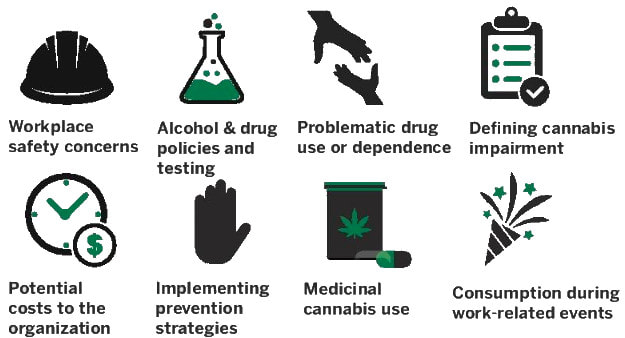Policy and Training Review: Cannabis in the Workplace
|
The Occupational Health and Safety Act, section 25(2)(h), states that employers must take every precaution reasonable in the circumstances for the protection of a worker. Due diligence to protect workers and provide safe working environments, including addressing safety risks due to cannabis impairment, are a critical component of the employer’s responsibility.
68% of employers have updated alcohol and drug policies because of Canada’s legalization of Cannabis – have you?Your workplace alcohol and drug policies should provide clear guidance about cannabis in the workplace for employees. Workplace Fit for Duty policies should no longer cite cannabis as an illicit substance, but they should outline the expectations regarding conduct in the workplace. This applies to small and medium sized organizations, as well as large companies.
When it comes to cannabis in the workplace, safety should always come first. Because there is no straightforward test for cannabis impairment and the active ingredient in cannabis (tetrahydrocannabinol or THC) can be found during urine testing for up to 30 days after a worker uses cannabis, it can be challenging for employers to screen for impairment [1]. Testing techniques for cannabis impairment are improving, but until the time when a simple, definitive test to gauge the level of cannabis impairment is developed, employers should ensure that managers, supervisors and employees have adequate training about the effects of cannabis and how to identify signs of impairment, for example, use of Reasonable Suspicion Checklists. |
 Employers have the right to regulate cannabis usage at work.
Workers have the right to a safe workplace. |
8 key issues that employers should address when considering cannabis legalization
1/3 of organizations offer employees educational materials related to cannabis
Cannabis Education in the Workplace
Most employers are relying on employee assistant programs or online educational training courses to inform employees. Education employees about the cannabis in the workplace will ensure that workers have accurate and up-to-date information. This proactive approach can help prevent problematic cannabis.
Employee education programs should cover:
Education and training programs should focus on developing employee understanding, not just transmitting information. Ensuring proof of competency is key in supporting all efforts taken to protect your people and maintain business continuity.
MidSouthWest offers convenient online training about the rights and responsibilities of both employees and employers when it comes to cannabis in Canadian workplaces, including:
Employee education programs should cover:
- Quantities of THC in products
- Effects of different ingestion methods
- Strains of the drug
- Effects of impairment
- Changes to alcohol and drug policies
- Tools, training and support available
Education and training programs should focus on developing employee understanding, not just transmitting information. Ensuring proof of competency is key in supporting all efforts taken to protect your people and maintain business continuity.
MidSouthWest offers convenient online training about the rights and responsibilities of both employees and employers when it comes to cannabis in Canadian workplaces, including:
Last updated October 4, 2019






